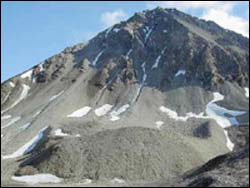
A University of Colorado at Boulder research team has discovered evidence of microbial activity in a rock glacier high above tree line in the Rocky Mountains, a barren environment previously thought to be devoid of life.
Found in an intermittent stream draining from the glacier, the evidence includes traces of dissolved organic material and high levels of nitrates, said Mark Williams, a fellow at CU-Boulder’s Institute of Arctic and Alpine Research. The high nitrate levels
Ice dams across the deepest gorge on Earth created some of the highest-elevation lakes in history. New research shows the most recent of these lakes, in the Himalaya Mountains of Tibet, broke through its ice barrier somewhere between 600 and 900 AD, causing massive torrents of water to pour through the Himalayas into India.
Geological evidence points to the existence of at least three lakes, and probably four, at various times in history when glacial ice from the Himalayas blocked
Coral reefs around the world could expand in size by up to a third in response to increased ocean warming and the greenhouse effect, according to Australian scientists.
“Our analysis suggests that ocean warming will foster considerably faster future rates of coral reef growth that will eventually exceed pre-industrial rates by as much as 35 per cent by 2100,” says Dr Ben McNeil, an oceanographer from the University of News South Wales. “Our finding stands in stark contrast to prev
A team of University of Minnesota scientists has discovered how iron- and chromium-rich rocks can generate natural gas (methane) and related hydrocarbons when reacted with superheated fluids circulating deep beneath the floor of the Atlantic Ocean.
Because the process is completely nonbiological, the hydrocarbons could have been a source of “food” for some of the first organisms to inhabit the Earth. Also, methane is a potent greenhouse gas, and this process may have contributed t
They contributed to ice-age deep freeze
Labrador Sea ocean tides dislodged huge Arctic icebergs thousands of years ago, carrying gigantic ice-rafted debris across the ocean and contributing to the ice age’s deep freeze, say an international team of university researchers.
The study, published in the November issue of Nature, is the first to suggest that ocean tides contributed to enigmatic Heinrich events, a phenomenon where colossal discharges of icebergs periodicall
A new study has revealed a mechanism that counters established thinking on how the rate at which tectonic plates separate along mid-ocean ridges controls processes such as heat transfer in geologic materials, energy circulation and even biological production.
The study also pioneered a new seismic technique – simultaneously shooting an array of 20 airguns to generate sound — for studying the Earth’s mantle, the layer beneath the 10- to 40-kilometer-deep crust on the seaflo